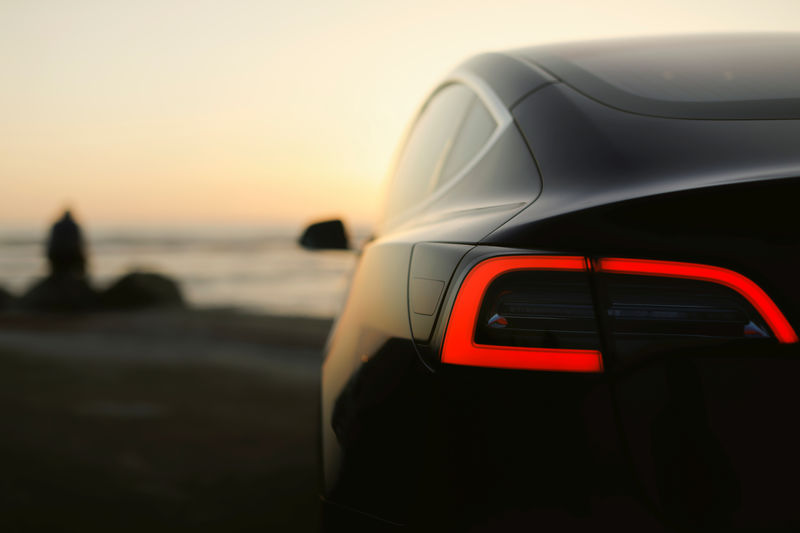© Reuters.
Investing.com — Here is your weekly Pro Recap of the past week’s biggest headlines in the electric vehicle space: EV makers are hitting pause on EV production; BP makes a deal; and Tesla escapes EU probe.
As always, InvestingPro users got these headlines at lightning speed. Never miss another opportunity to secure an edge for your portfolio.
EV makers take cautious approach to slowing demand
The recent cautious approach adopted by major automotive players has signaled a significant shift in the electric vehicle (EV) market.
Tesla (NASDAQ:) announced Wednesday that it will slow its production ramp, echoing the cautious approach of General Motors (NYSE:), which revealed Tuesday a decision to delay the production of its electric pickup trucks, reflecting a broader industry trend.
GM’s CEO, Mary Barra, emphasized the need to “moderate” the acceleration of EV production in North America, citing a recent slowdown in consumer demand for EVs.
This reticence is not confined to GM and Tesla. Ford (NYSE:), in a similar move, scaled back its electric vehicle ramp-up, temporarily reducing shifts at a key manufacturing plant. The decision comes as the company has decided to redirect its investments toward the production of commercial vehicles and hybrids.
Meanwhile, the challenges faced by Hertz (NASDAQ:) and Porsche (ETR:) (OTC:) underscore the broader complexities of the EV sector. Hertz, with an estimated 50,000 EVs in its fleet, has chosen to decelerate the electrification process as Tesla’s recent price cuts have significantly impacted the resale value of electric cars in the rental fleet, prompting a cautious reassessment of the company’s electrification goals.
Similarly, Porsche’s decision to postpone the production of the Macan electric SUV until next year echoes the challenges faced by the industry at large. Contributing to Porsche’s setback have been delays in Volkswagen’s (ETR:) (OTC:) development of crucial automative software through its CARIAD division.
BP Pulse steps up with $100M deal
Oil-and-gas conglomerate BP (LON:) (NYSE:) on Thursday announced a $100 million deal in which its EV charging arm, BP Pulse, agreed to deploy Tesla ultra-fast charging hardware units at strategic locations within the BP family of brands starting in 2024.
Those brands include TravelCenters of America (NASDAQ:), Thorntons, ampm, and Amoco, as well as at its Gigahub charging sites and third-party locations like Hertz – and initial installation sites have already been earmarked in Houston, Phoenix, Los Angeles, Chicago, and Washington, DC.
These Tesla chargers will bear the BP Pulse branding, and BP will oversee their installation and operation. Equipped with Tesla’s “Magic Dock,” the chargers will support both North American Charging Standard (NACS) and Combined Charging System (CCS) connectors.
BP Pulse has already installed more than 27,000 charge points as part of the company’s commitment to invest up to $1 billion in EV charging across the US by 2030.
Tesla escapes EU probe
Tesla was able to breathe a sigh of relief on Friday as reports indicated that the European Union’s investigation into Chinese government subsidies would not include the EV giant. However, Tesla may still face potential duties linked to its own identified subsidies.
Despite Tesla’s prominent shipment of electric vehicles from China to Europe, the EU’s investigation is concentrated on three specific Chinese manufacturers: BYD, SAIC Motor, and Geely.
SAIC Motor operates as a state-owned entity, while Geely and BYD, established in 1986 and 1995, respectively, are privately held companies (Geely’s subsidiary, Geely Automobile Holdings (HK:) (OTC:) is publicly traded), as is Byd’s parent (SZ:), a manufacturing conglomerate). Nonetheless, it’s likely that all three firms have received more direct subsidies over the last few decades than international brands.
It is worth noting that, should the initial investigation uncover indications of unfair competition due to distorted subsidies among the Chinese manufacturers, Tesla, along with other companies manufacturing vehicles in China for the European market, may find themselves included in a subsequent probe.
Shares of TSLA shot up 5.8% Monday before hitting a weekly high of $221.03/sh on Tuesday. TSLA ended the week up 2.16%.

Read the full article here





